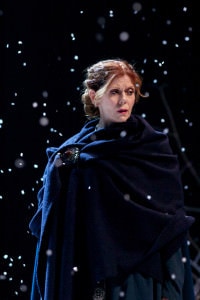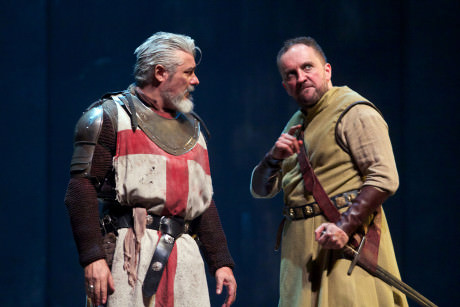As the guerilla war in Dunsinane intensifies, Siward, the English commander sent to Scotland to bring peace to the warring clans, admits to burning to death a village’s captured adult males.
In light of recent events in Islamic State — namely, the burning to death of a captured Jordanian pilot — the thousand year parallels rippled like a tsunami through the audience. Invade another country on a mission of peace, and the resultant carnage brings forever war.

Such is the United States premiere of David Greig’s Dunsinane, now playing at the Shakespeare Theatre’s Sidney Harman Hall. Billed as a sequel to Shakespeare’s Macbeth, Dunsinane acts more like an antidote. If the old fable, “The Man and the Lion,” is correct, and the lion’s complaint that “he should not be so misrepresented ‘”when the lions wrote history’,” then Dunsinane is the lion’s tale.
And this story is as beautiful as it is thought-provoking, and is guaranteed to turn your imperial world upside down.
Meet Gruach, aka. Lady Macbeth, played with dazzling power by Siobhan Redmond. No longer the royal “bitch” who ruins her good lord Macbeth with a witch’s spells, now she is the queen who “encouraged” her husband to end decades of civil war, a stability that lasted 14 years, until Malcolm and Macduff return to Scotland to kill the “tyrant” with their English army.
Like in Iraq, with the overthrow and subsequent killing of the “tyrant” Saddam Hussein, the “mission accomplished” banner flying over Dunsinane is way too premature. Imperial invaders think — all too magically — that conquest is easily won.
In truth, however, in Dunsinane as in most places, conquest is more than difficult: conquest is forever.
Siward, played with an earthy swagger by Darrell D’Silva, meets Gruach as he and his motley crew of soldiers enter the castle. Thinking Lady Macbeth dead — obviously an English reportage — he mistakes her for a member of the castle staff. He soon finds out that this sensuously regal woman is more than an equal to his brawny birthright.
Siward and Gruach’s scenes together are a master class in incredible acting, a seemingly effortless give and take that sweeps through the auditorium, leaving each viewer in utter belief.
Siward has come to Dunsinane to install a new king, Malcolm, played with great aplomb by Ewan Donald. His Malcolm knows that “discretion is the better part of valor;” or in his case wine, women, song, and dancing are better than any tough guy theatrics. In a nation of powerful chiefs, it is better to be “the king of good times” than the emperor with a target on his forehead. Those moments when he counsels the headstrong and forceful Siward on the benefits of ambiguity are as wise as they are funny.
Macduff also returns to Dunsinane and, as played by Keith Fleming, he exudes empathy for his war-torn people. He does not want the English to leave his country, even though he cannot foresee a positive result with them staying.
Neither can the English Sergeant, played by George Brockbanks with a sincere “give me warm weather” nostalgia. He captures perfectly the soldier’s homesickness, which leads to that inevitable question: why are we here?
The rest of Dunsinane’s gifted cast consists mostly of the young English soldiers that Siward leads into battle, chief among them the story’s boy-narrator, played by a charismatic Tom Gill. Ironically, we hear this Scottish tale through his words, as he periodically steps in front of the “curtain” to give us his childlike account of the strange goings-on in Scotland’s cold and magical land.
The soldiers include Toyin Omari-Kinch as Eric the Archer, Alex Mann as Egham, Arthur McBain as English Soldier, and Matt McClure as a Scottish and an English Soldier. As an ensemble their combination of playful antics and fearful encounters brilliantly represent the young soldiers’ cruelly dichotomous life.
One particular scene between the hen girl, played with a debilitating shyness by Helen Darbyshire, and Omari-Kinch’s laddishly charming Eric, epitomizes the tragic implications of Dunsinane’s situation. The boy finds the hen girl coquettishly appealing; they flirt from afar; they tease up close; but in a world dominated by the invader/occupied dynamic, all semblance of clarity, all possibility of simple attraction, is void as a blade spills their blood in an inevitable mounting hatred.
The rest of the cast consists of four supernumeraries — Freddie Bennett, David Mavricos, Shane O’Loughlin, and Zack Powell — and a Gaelic singer, Mairi Morrison, whose vocal renditions fill the space with a sense of the holy.
Roxana Silbert directs the excellent cast and production team to shimmering effect, as we are offered a fascinating mix of comic situations, rooted in a foreigner’s misunderstanding of the Other’s world, and gut-wrenchingly heartbreaking results.
The production’s scenography is equally splendid. Led by Designer Robert Innes Hopkins and Lighting Designer Chahine Yavroyan, each moment is a feast of contextualizing imagery, from a prolonged snowfall on a Scottish lake to the gloomy steps of a vanquished castle.
Composer and Sound Designer Nick Powell add effective punctuation to the action, and a special nod must be given to Fight Director Terry King, as the production’s violence is handled with seamless verisimilitude.

Once again, Shakespeare Theatre Company needs to be commended for bringing to Washington, DC, the nation’s capital, a powerful drama that sheds a theatrical spotlight on some of the most important issues of our time: the cycles of violence that plague our world, the cruel dynamic between the occupiers and the occupied, and the senseless idea that it would ever become “necessary to destroy the town to save it.”
There may not be a definitive solution to these problems; but, as Dunsinane makes clear, there is nothing but madness in the repetition of a failure.
Running Time: 2 hours and 15 minutes, with a 15-minute introduction.
Dunsinane plays at Shakespeare Theatre’s Sidney Harmon Hall, 610 F Street, NW, in Washington, DC, through February 21, 2015. For tickets, call the box office at (202) 547-1122, or purchase them online.
RATING:





